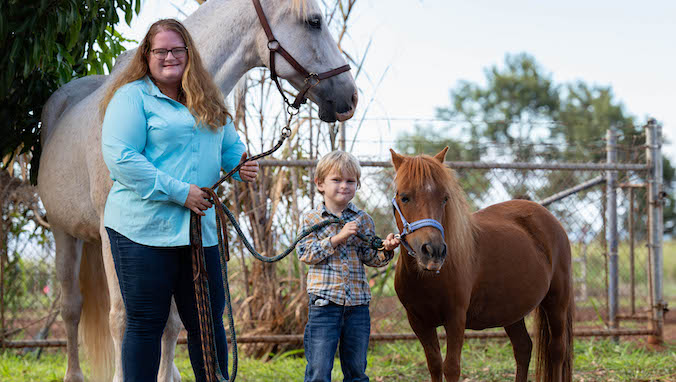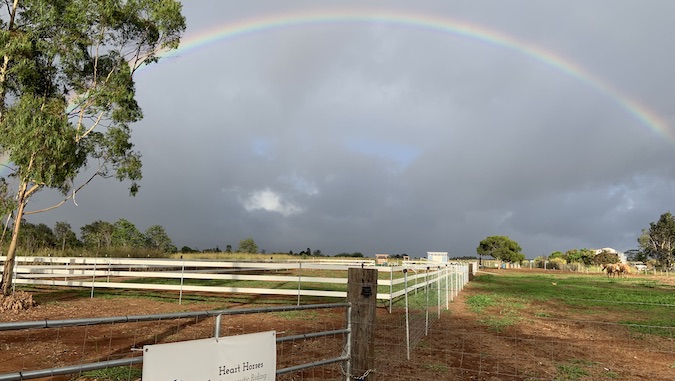
A love for horses from a young age, and her passion for human health inspired Sonja Bigalke-Bannan to create her own business. The University of Hawaiʻi at Mānoa Thompson School of Social Work & Public Health alumna owns and runs Heart Horses, a unique therapy facility on Oʻahu’s North Shore that offers therapeutic horseback and equine-assisted psychotherapy.
Being around horses gives clients insight into their own feelings
—Sonja Bigalke-Bannan
Survivors of traumatic experiences may live in a state of hypervigilance, constantly looking out for danger or threats in a way that’s harmful to their health, according to Bigalke-Bannan. Learning to release themselves from that state is difficult and overwhelming, and equine-assisted therapy can help.
“Horses are naturally hypervigilant, and their senses are better than ours, but they can also go calm quickly, so they can teach humans how to get out of a hyperarousal state,” she said. “By developing a connection with a horse, people can learn to ground themselves.”
Developing her childhood connection with horses
Bigalke-Bannan took over Heart Horses from a previous owner after earning her master of social work from UH Mānoa in 2014. She received additional state licensure and is also a licensed clinical social worker.
Her fondness for horses began at age six when she took riding lessons with her Brownie troop. Later in college, she taught conventional horseback riding lessons when she got a request from a faculty member with Parkinson disease who wanted to learn to ride. Then, a student who was legally blind also asked to participate.
“Working with them was so liberating,” she said. “It was so inspiring to see what people can do if they are given a chance and the right support.”
Assisting clients with variety of conditions
Heart Horses has helped a variety of clients, ages 2 to 84 years old, with a wide range of health conditions. People with conditions that limit their mobility, such as Parkinson’s disease and cerebral palsy, or biobehavioral conditions such as schizoaffective disorder or bipolar disorder, or even neurodevelopmental conditions such as autism spectrum disorder and attention deficit/hyperactivity disorder, can all benefit from equine therapy.
“Horses mirror human emotions—their behaviors reflect the energy and intent of the person,” Bigalke-Bannan said. “Being around horses gives clients insight into their own feelings and provides them with awareness of the patterns and behaviors that may be hindering their ability to find effective solutions.”

Heart Horses offers several modalities of therapy, including therapeutic horseback riding and equine-assisted psychotherapy. Therapeutic horseback riding can help clients to improve their motor function, sitting posture and balance, decrease muscle tension, and help with anxiety and depression symptoms.
In equine-assisted psychotherapy, “talk therapy” sessions take place inside the round pen or arena with the horses. As the patient and therapist discuss the patient’s trauma and try to process it, the horse is loose in the pen and can choose to interact with the client as they want to. The presence of the horse can help the patient to feel safe during therapy.
Social workers who conduct these sessions are trained in using these techniques and become certified in conducting these therapies. Bigalke-Bannan is certified in equine therapy by the Equine Assisted Growth and Learning Association and Equi-Lateral, and is an Eye Movement Desensitization and Reprocessing therapist.
Partnerships and volunteers
In addition to referrals from psychotherapists and physicians, Heart Horses partners with several community organizations to assist clients. They include the Wounded Warrior Project, Pearl Haven, a residential facility for adolescents who have survived sexual exploitation or trafficking, and Sprouts, a program which provides physical therapy and occupational therapy for children.
All clients become empowered to face their health challenges through the process of working and communicating with the horses. “Everyone who comes here learns horse science, horse safety and horse care. They groom their horse, and learn about the equipment,” Bigalke-Bannan said.
The facility’s many volunteers, who help to care for the horses and help upkeep the facility, come from all over the island and as far as California and Canada. In addition, as an adjunct instructor in field studies, Bigalke-Bannan supports future social workers at the Thompson School of Social Work & Public Health. Heart Horses serves as a field placement site for MSW students.
The most rewarding aspect of the work for Bigalke-Bannan is providing a space for people that is calm and quiet, and separate from the rest of their busy lives. “The farm is a very peaceful space. It provides a wonderful backdrop for healing and personal growth,” she said.


